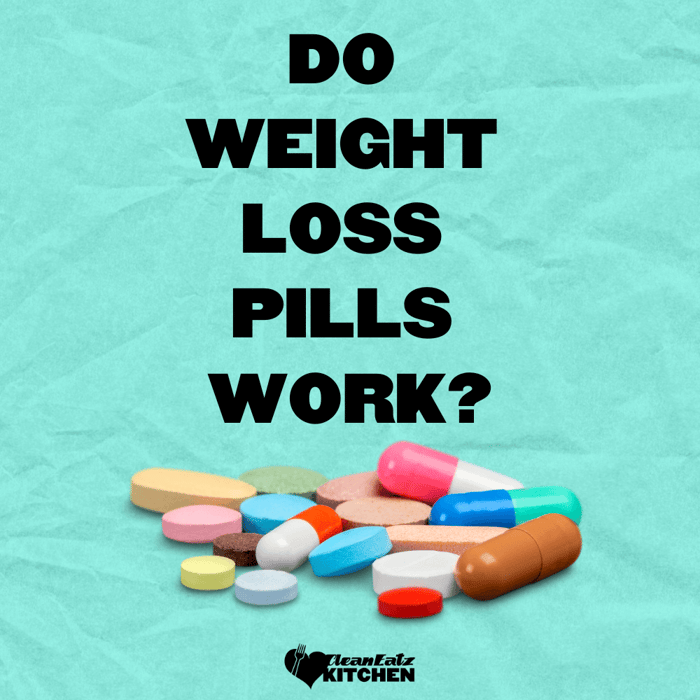Do Weight Loss Pills Work?

Jason Nista
Nutrition
|
Weight Loss
|
Healthy Lifestyle
08/11/2022 12:00pm
12 minute read
Gaining excess and unhealthy weight can pose challenges. Everyone aspires to have a fit and healthy body. With numerous weight loss methods available, opting for weight loss pills emerges as a convenient approach for faster weight loss. Yet, you may find yourself questioning the effectiveness of these pills: "Do weight loss pills work?"
If you are planning to lose weight using weight loss pills, this post will help you uncover the following details:
- What are weight loss pills?
- The different types of weight loss pills
- Do weight loss pills work?
- How do weight loss pills work?
- Are weight loss pills safe?
What Are Weight Loss Pills?
Weight loss pills are often called diet pills or anti-obesity drugs. The primary purpose of these weight loss supplements is to reduce appetite and food cravings. In other words, weight loss pills can help you control hunger and minimize calorie intake. So, the fewer calories your body consumes than you burn, the more pounds you can shed.
Weight loss pills may contain a variety or combination of ingredients such as fiber, herbs, and minerals. The common ingredients in weight loss supplements are African mango, Beta-glucans, caffeine, calcium, capsaicin, carnitine, chromium, conjugated linoleic acid (CLA), fucoxanthin, garcinia Cambogia, glucomannan, green tea, and green tea extract, probiotics, or pyruvate.
FDA Approved Short Term Weight Loss Drugs
- Lorcaserin (Belviq)
- Phentermine (Adipex-P, Fastin)
FDA Approved Long Term Weight Loss Drugs
- Phentermine/topiramate (Qsymia)
- Naltrexone/bupropion (Contrave)
- Liraglutide (Saxenda)
Do Weight Loss Pills Actually Work?
Weight loss pills help treat obesity, but they are not the magic bullet that lets you reduce pounds with less effort. You have to be aware that weight loss pills are formulated to address every person's need to lose weight. In fact, only a few can say that using weight loss pills is the best and most effective to reduce some extra pounds.
It's crucial to consult with a healthcare professional before starting any weight loss pill regimen to ensure it is safe and suitable for your specific needs. Remember, sustainable weight loss requires a holistic approach that combines various healthy habits for long-term success.
How Do Weight Loss Pills Work?
Manufacturers of weight loss pills often make claims about the effectiveness of their products in promoting weight loss. Here are a few mechanisms by which weight loss pills are said to work:
- Blocking Fat or Carbohydrate Absorption: Some weight loss pills are designed to inhibit the absorption of dietary fats or carbohydrates in the body. By doing so, they aim to reduce the overall calorie intake and promote weight loss.
- Appetite Suppression: Certain weight loss pills are formulated to help curb your appetite, leading to a decreased desire to eat. By reducing calorie consumption, these pills may contribute to weight loss efforts.
- Metabolism Boost: Another approach taken by weight loss pills is to increase the body's metabolic rate. By speeding up the metabolism, these pills claim to help burn calories more efficiently, potentially aiding in weight loss.
It's important to note that individual responses to weight loss pills may vary, and their effectiveness is not guaranteed for everyone. Moreover, they are expensive, and some of these products can interact or interfere with medications or cause harm to your health. So if you have health problems it'll be better to stick to easy workouts and snacking on clean protein bars.
Top Prescription Weight Loss Medications
Ozempic
Ozempic is an injectable prescription medication for chronic weight management. It works by stimulating the release of insulin to control blood sugar levels, which can also decrease appetite and food intake. Ozempic is taken as a once-weekly injection, with dose adjustments possible based on your weight loss and blood sugar goals. Common side effects include nausea, diarrhea, and constipation.
Wegovy
Wegovy is a higher-dose formulation of Ozempic, specifically approved for weight loss. It can produce an average loss of 12-15% of initial body weight when used in combination with a reduced-calorie diet and exercise. Wegovy may cause similar side effects as Ozempic. It is also a once-weekly injection with dose changes possible based on how much weight you need to lose.
Mounjaro
Mounjaro is a new prescription weight loss medication that works as a dual incretin mimetic, activating receptors for both GLP-1 and GIP, two hormones involved in blood sugar control and metabolism. Early studies show Mounjaro can produce up to 22% weight loss over 72 weeks. The most common side effects include nausea, diarrhea, and headaches. Mounjaro will be available as a once-weekly injectable, with different dosing options depending on your weight loss needs.
Danuglipron and Orforglipron
These two investigational medications are oral GLP-1 receptor agonists, which means they work similarly to Ozempic and Wegovy but are taken as a pill instead of an injection. They are still in clinical trials but early results suggest they may produce up to 15% weight loss, comparable to injectable options, with similar side effects like nausea and diarrhea. If approved, they would provide an oral alternative to weight loss shots.
Rybelsus
Rybelsus is the first oral GLP-1 receptor agonist approved for diabetes and weight loss. It is taken as a daily pill and has been shown to lower A1c, a measure of long-term blood sugar control, by up to 1.5% and produce around 7% weight loss. The most common side effects are also nausea, diarrhea, and constipation. Rybelsus may be a good option if you prefer to take a daily pill instead of weekly injections.
With so many new prescription weight loss drugs on the market or in development, there are more options than ever to support your weight management goals. Talk to your doctor about whether medication, alone or combined with lifestyle changes, is right for you based on your health needs and how much weight you have to lose.
Popular Over-the-Counter Diet Pills
When it comes to over-the-counter diet pills, there are a few popular options available. However, some work better than others and have fewer side effects. It’s important to understand how these pills work and which ingredients actually help with weight loss.
Berberine
Berberine is a compound found in several plants, including barberry, goldenseal, and turmeric. Berberine supplements are popular natural remedies used to aid weight loss and lower blood sugar. Studies show berberine may inhibit fat cell formation, improve fat burning, and reduce inflammation. However, high doses of berberine may cause nausea, diarrhea, and abdominal pain in some people.
Green Tea Extract
Green tea extract contains compounds like EGCG that can increase fat burning and provide antioxidant benefits. Some research shows green tea extract supplements may enhance weight loss and fat loss. However, the effects seem to be relatively modest. Green tea extract is considered very safe for most adults, but high doses may cause insomnia, diarrhea, and irritability.
Conjugated Equine Estrogens (CEE)
CEE refers to estrogen derived from pregnant mares' urine. Estrogen therapy is a form of Hormone Replacement Therapy (HRT), which was once used for weight loss and body shaping in postmenopausal women. However, due to health risks like increased cancer, heart disease, and stroke, estrogen therapy is no longer recommended for weight loss. Safer options include lifestyle changes like diet and exercise.
In summary, some popular over-the-counter diet pills may provide minor benefits for weight loss, but many do not live up to the hype and also pose risks. The most effective way to lose weight long-term is through a balanced diet and regular exercise. Diet pills are not a substitute, and should only be used under medical supervision. Lifestyle interventions remain the healthiest approach.
So there you have it, the latest and greatest in the world of diet pills. As you can see, there are plenty of options out there promising easy weight loss in a pill. But remember, if something sounds too good to be true, it usually is. The only proven way to lose weight in a safe and sustainable way is through diet and exercise. While these new drugs may provide some benefit as an adjunct to lifestyle changes, there are simply no shortcuts when it comes to improving your health and waistline. At the end of the day, the latest diet pills won't make you any happier or healthier. Only you have the power to achieve those goals. So save your money, focus on eating right and moving more, and you'll reach your fitness goals in no time!
To help you eat healthy for the purpose of losing weight, Clean Eatz Kitchen is exactly what you need! We offer all sorts of different meal plans designed to support various fitness goals.
Who Should Use Weight Loss Pills?
Weight loss pills are typically recommended for individuals who fall into the following categories:
- Individuals with a Body Mass Index (BMI) above 30.0: Weight loss pills are often considered for those who have a BMI of 30.0 or higher, which is classified as obese. These pills may provide additional support in their weight loss journey alongside lifestyle changes.
- People with a Body Mass Index (BMI) greater than 27 and medical problems linked to obesity: In some cases, weight loss pills may be prescribed to individuals with a BMI greater than 27 who also have obesity-related medical conditions such as high blood pressure, diabetes, or cardiovascular disease. The pills may assist in managing these conditions by aiding in weight loss.
Talk to your healthcare provider before popping a weight loss pill. This is necessary, especially for individuals that have hypertension, diabetes, cardiovascular disease, liver disease, or other medical conditions.
Are Weight Loss Pills Safe?
After answering the question "Do weight loss pills work?", another important question arises: "Are weight loss pills safe?"
Don't be surprised to discover that manufacturers of weight loss pills rarely carry out studies on people to see the effectiveness and safety of their formula. If there are, these are more likely short-term studies done on a small number of people who used their product. We recommend that you choose a reputable weight loss pill manufacturer who has conducted a large long-term study on its safety and effectiveness.
Some of these weight loss pills may be safe to some extent. Always bear in mind that overdosing and taking unprescribed pills weight loss pills can lead to a variety of medical complications. Plus, weight loss pills might counter the effect of other medications you are taking.
According to a 2014 study, about 2500 people were given the target to shed 30 pounds in a year. Can you imagine that there were only 4% of them who chose to do it through diet pills? When asked why they chose a workout and weight loss meal plan rather than pills, they explained that they were distrustful of its effectiveness and that it might even lead to unwanted side effects.
Final Thoughts
Weight loss pills are safe as long as they are taken under the supervision of your physician or dietitian. Again, it is not for anyone who simply wants to lose weight.
Remember that the best and proven ways to lose weight are to eat various healthy foods, reduce calorie consumption, and stay physically active.
Be skeptical about weight loss pills being labeled as "magic diet pills," "melt away fat," and "lose excess pounds without diet or exercise. Anything that sounds too good to be true probably is (or not at all). Some products may not even help you lose weight and could be dangerous to your health.
FAQ
How fast do water pills work for weight loss?
The speed at which water pills (diuretics) work for weight loss can vary depending on the individual and the specific product used. Water pills primarily help to reduce excess water retention in the body rather than burning fat. While they may result in temporary weight loss, it is important to note that this weight loss is typically due to water loss and not fat loss.
Can a 14-year-old take weight loss pills?
It is generally not recommended for young individuals, including 14-year-olds, to take weight loss pills without proper medical supervision. Weight loss pills can have specific dosage requirements and potential side effects that may not be suitable for adolescents. It is advisable for young individuals to focus on adopting a balanced and healthy lifestyle, including regular exercise and a nutritious diet, to manage weight in a safe and sustainable manner. It is always recommended to consult with a healthcare professional before considering any weight loss interventions for teenagers.
What are the side effects of weight loss pills?
The side effects of weight loss pills can vary depending on the specific medication and individual factors. Common side effects may include nausea, vomiting, diarrhea, stomach discomfort, increased heart rate, elevated blood pressure, insomnia, and dry mouth. Some weight loss pills may also have more serious side effects, such as liver damage or mood changes. It is essential to carefully read the product information and consult with a healthcare professional for a thorough understanding of potential side effects before starting any weight loss pill regimen.
How do I ask my doctor for weight loss pills?
If you are considering weight loss pills and believe they may be suitable for your circumstances, it is recommended to schedule an appointment with your healthcare provider. During the appointment, openly discuss your weight loss goals and concerns. Your doctor will evaluate your overall health, medical history, and any pre-existing conditions to determine the appropriateness and safety of weight loss pills for you. They can provide personalized guidance, recommend specific medications if appropriate, and monitor your progress to ensure your weight loss journey is both effective and safe.
Related Articles
Fasted Cardio: Does Training Empty Help Fat Loss?
4 minute read
Can You Drink Diet Soda on Keto?
5 minute read
Top 6 Health Benefits of Lemon Water
7 minute read



